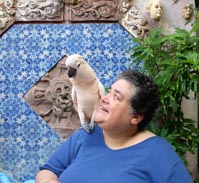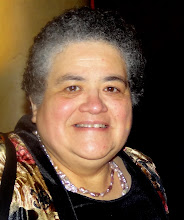Nuestros Hijos and the Iraq and Afghan Wars:
|
What this means to our Latino communities
|
Finding a person who knows how to cut curly hair is not easy. Lately, I've been visiting a salon in a Dominican neighborhood of Providence, where I live. I was sitting in the chair, wrapped in the plastic apron, when I spotted a photograph of a young man in uniform on the stylist's mirror.
"
¿Su hijo?" I asked. "
No, un vecino," a neighborhood boy, the stylist replied. Then she told me his bone-chilling story.
The young man had been blown up when his jeep hit an IED (improvised explosive device) in Iraq. Now he is in an army hospital in Texas. He lost his limbs, a buttock, his anus, and has severe head injuries that have damaged his ability to think. Given his injuries, I cannot imagine what the quality of his life could be. His mother is now alone in Providence; her husband abandoned her years ago, and her other son was lost to street violence. The salon was raising money to finance the mother's trip to Texas to be near her surviving son.
The government does not provide funding for that purpose. In fact, the Veterans Administration has been slow to respond to the need for treatment for vets with post-traumatic stress syndrome, as well as the head traumas and amputations, extreme physical disabilities that are the worst wounds of war. Helping families to travel to distant facilities where their wounded sons and daughters are being treated isn't even broached with Congress. Recently, Jim Webb led the Senate to pass part of an emergency spending bill that revises and upgrades GI benefits. Republican presidential candidate Senator John McCain voted against it, saying that the benefits would be so attractive as to be a disinvestment for soldiers to reenlist.
To our everlasting shame, this nation, which prides itself on having the finest military force in the world, is miserly in the rewards it gives those warriors upon their return.
The government has been negligent in the distribution of veterans' health care and permanent disability support. Systemic dysfunction can be seen in the undervaluing of injured veterans' disability ratings, forcing many of the most severely disabled to fight the system by hiring lawyers to intervene on their behalf, and resulting in delays of months in the awarding of benefits to wounded soldiers who deserve them.
Last year,
Washington Post investigative reporters uncovered severe neglect in the facilities at Walter Reed Army Medical Center in Washington, D.C. The problems included rat- and cockroach-infested quarters; a lack of heat and water, as well as security problems that resulted in injured soldiers having to stand guard duty!
When the wars in Afghanistan and Iraq were mounted, few asked if we could afford them. Honor, revenge, power, and hubris overrode good sense in the rush to take up arms. We put the best interests of our own people at home in jeopardy in order to buy the costly weapons of war. How many school systems would be supported for the cost of one bomber? One helicopter? One load of bombs? How many schools could be built, outfitted and staffed by the money we are spending on Bhagdad's Green Zone? How many job programs and training programs could be funded to put all our unemployed to work? How many gangs could be undermined and prisons emptied if we poured the money we spent in Iraq in one year on education, training, and helping our impoverished citizens to get on their feet?
Our bridges and freeways are crumbling while Army engineers build armed fortresses in Iraq. Would it be a violation of government policy to put them to work here, rebuilding the infrastructure that we need?
In the run-up to the wars, President Bush insisted that he would not need draftees to conduct the war. As long as unemployed and underemployed people could be enticed by fat signing bonuses and the promise of funding for college, the pool of soldiers would remain large. For the first time in our history, we have a professional, all-volunteer standing army.
Many of the members of our armed services signed up because of a lack of job opportunities; they saw the military as a way to develop valuable job skills and experience. Most who signed up for the National Guard trained with the expectation of serving close to home. A weekend a month and a month's training in the summer prepared them for national emergencies at home. Once deployed, they never expected to be sent to Iraq or Afghanistan for second and third tours of duty because of Bush's stop-loss policy, his solution to the problem of replenishing the demand for troops and fudging the promise not to reinstate the draft. Instead, we have a backdoor draft that is taking advantage of the aspirations of our economically disadvantaged for better lives.
What has that meant for Latino communities?
Of the 157,000 American troops in Iraq and Afghanistan at the height of the surge, 10.5% are Latino/as; 17% of the combat troops are Latino. But there is a hidden layer: Over 8,000 non-citizen Mexicans are fighting for this country in exchange for the promise of citizenship if they survive the ordeal; nor are they the only foreign nationals seeking to earn citizenship in the same way. This has been a traditional way that the United States armed services have filled out their rosters, unbeknownst to many Americans.
What happens to a Mexican national when he is gravely injured? Will his family be allowed to come over the border to attend to him in a hospital in Texas? Who will advocate for him in Congress?
The military itself is not the only recipient of government monies allotted to war spending. In this war, profiteers have been quietly legitimized by the current administration. Blackwater, and Vice President Cheney's company, Halliburton, among others, have made billions of taxpayer dollars in no-bid contracts. The professional army is "spared" day-to-day tasks and certain protection duties because Blackwater -- which is subject neither to governmental or military control -- has taken them over, for steep fees.
No wonder Bush crowed that he did not need to reestablish the draft: By engaging in a shell game, he can boast of the greatest military force in the world, run a parallel universe of mercenaries and contractors, and hoodwink the poorest Americans and immigrants yearning for legitimacy into enlisting.
Profiteering is no longer a dishonorable activity. Kleptocracy, ie., a ruling class that guts the public treasury, is now the rule of the day in the US, as is kakistocracy, rule by the worst or most unprincipled leaders.
We will be paying for these wars long after the neoconservatives who started them have gone on to their eternal punishment. The Almighty should put government officials who bequeath such extreme debt to one's children and grandchildren in the first circle of hell. War is such a costly venture, it is hard for a reasonable person to understand what would possess a country to go to war. Looking at the bare and shameless profiteering in America's two current wars, there is only one answer: Greed.
And that wounded soldier's Mamita, trying to find a way to be by his side? She's on her own, still trying to scrape together her fare to Texas.
published on Mi Apogeo, September 2008http://miapogeo.com/main/content/view/300/932/





